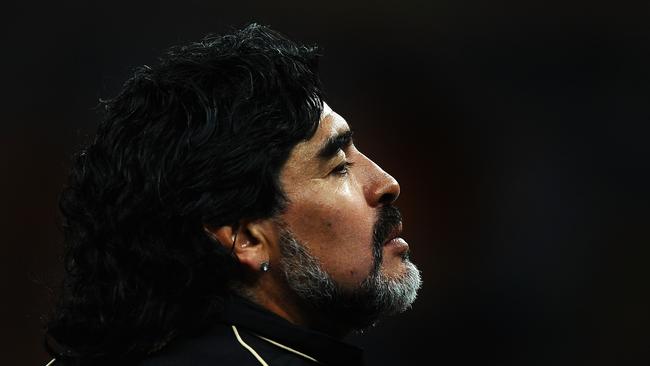
Professional triumphs. Private tragedies. Do a YouTube search for “Maradona Live Is Life.” It shows Maradona in all his crazed, loose-limbed, free-spirited glory. He’s warming up for Italian club side Napoli to the song of the same name. He may very well be high as a kite. His hair is long. There’s a dance in his step. A beatific, mischievous smile, half-angel, half-demon. He taps the ball off his left foot, off his knees, off his shoulders. Off his face. He balances it on his forehead like a performing seal. He swivels his hips like a sawn-off Elvis Presley, clapping, singing, controlling the ball like nothing else you’ll see. Genius. Best thing of all, his shoes laces are undone.

But let’s not confuse the player with the playa. Let’s not get too romantic now he’s kicked the bucket. Maradona always stated his mantra loud and clear. You could take him or leave him. Few things ended well. His greatest club years were with Napoli in Italy, when they sang from the stands, “Oh mamma, mamma, mamma! Oh mamma, mamma, mamma! Do you know why my heart is beating? I saw Maradona. I saw Maradona. Oh, mamma, I’m in love!” He was the world’s most expensive player who won two Serie A titles for the poorest club in Italy and a UEFA Cup. But it came crashing down with charges for tax fraud and cocaine possession, links to Mafia crime, a failed a drugs test – how many?! – and the club suing him for damaging its image. Let’s not sugar-coat who he was. We’re not saying goodbye to Little Lord Fauntleroy here. Once asked about his haters, he said: “To those who did not believe, now suck my dick – I’m sorry, ladies, for my words – and keep on sucking it. I am either white or black. I will never be grey in my life. You treated me as you did. Now keep on sucking … I am grateful to my players and to the Argentinian people … I thank no one but them. The rest, keep on sucking.”
He was the desperate, poverty-stricken, slum-inhabiting Buenos Aires kid who never stopped acting like it. So favoured. So flawed. He was like a child who never had a lolly but suddenly with a million of them at his disposal, he gorged on them all. Cocaine. Grog. Women. God only knows what else. He was regarded as “a divine figure” to impoverished Argentinians who saw him as proof it was possible to escape the dirt of a shantytown and conquer the world with swagger and a streetwise bravado. If some people didn’t like it, they could keep on sucking. He grew up forced to take what he could get as a matter of survival, and then he never stopped taking … and consuming … and gorging … as though he was still hoarding them up out the back of his slum. He was rough as guts, never pretending to be otherwise. He threw rocks at reporters. Kicked their shins. Shot at a few with an air rifle. Which high-profile athlete wouldn’t love to do that, for just one day? In 2000, when FIFA announced Maradona and Pele as joint players of the 20th century, he said the award “wasn’t worth shit” and Pele should “go back to the museum.”
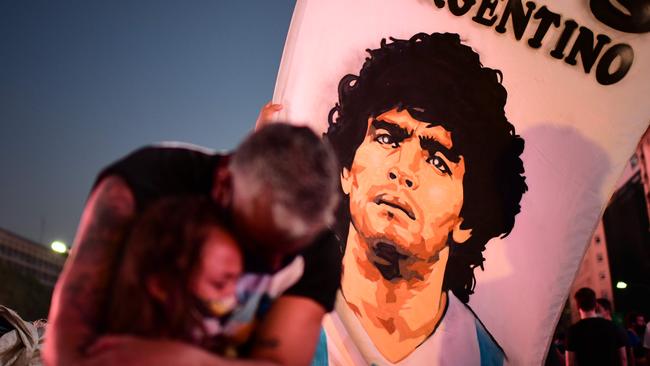
Private tragedies. Professional triumphs. He won Argentina the 1986 World Cup almost single-handedly, that hand supposedly belonging to God. What a crock that description was. He took the easy way out when explaining the cheating that allowed his most famous goal. We swooned at his poetic “Hand of God” description, not the least because it buried England in a World Cup game, you beauty, but now he’s been returned to sender, he might be inclined to apologise for dragging Him into it. Or God might point at the goal that came immediately afterwards, the greatest World Cup goal of all, and say, “You didn’t need me, old mate.”
Maradona’s petulant on-field behaviour was childlike. His lack of discipline in his day-to-day life was childlike. Everything was candy. His eagerness to show off was childlike. His complete lack of contrition was childlike. His bare honesty was childlike and raw. Argentines forgave him the drugs and hookers and alcoholism and criminality because they either knew of it, or were up to their necks in it, every day of their lives. If you have experienced the downtrodden, high-octane, swarming city of Buenos Aires, you have seen a thousand Maradonas, hustlers with big but dangerously hard-bitten hearts. Death or glory is in that city, and country, as Argentine writer Gustavo Bernstein once suggested: “Maradona is our maximum term of reference. No-one embodies our essence better. No-one bears our emblem more nobly. To no other … have we offered up so much passion. Argentina is Maradona, Maradona is Argentina.”
His first wife, Claudia Villafane, left him because of infidelities but even she forgave him, becoming his manager. He was the fifth of eight children born into a shanty town called Villa Fiorito. He was given a football as a birthday present at the age of three. That ball never left his feet. Aged eight, he trialled for Las Cebollitas, The Little Onions, a prestigious junior set-up. They refused to believe his age, telling him to go home and come back with ID. At halftime of senior games in Buenos Aires, he was ushered onto the pitch to do tricks for the crowd. Live Is Life. As a teenager he said, “I have two dreams. My first dream is to play in the World Cup. The second is to win it.”
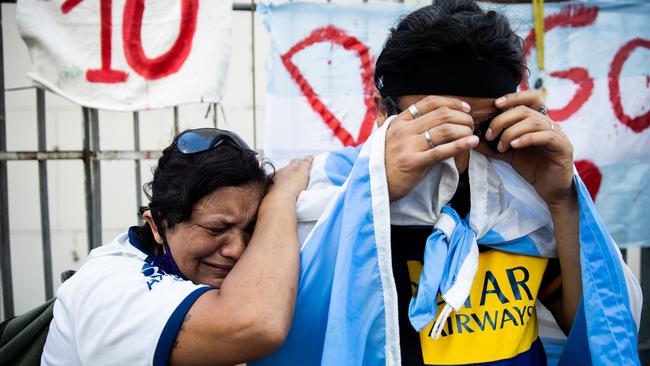
Maradona was Argentina captain at the 1986 World Cup. Twenty-six years of age. In his absolute untouchable pomp. In the quarter-finals, Argentina played England. No Argentine had forgotten the Falklands War. Maradona leapt for a high ball alongside England goalkeeper Peter Shilton. Maradona was 165cm. Shilton, 185cm. Maradona palmed it in. The referee missed it, or chose to ignore it. “A little with the head of Maradona, and a little with the hand of God.” A little of Maradona’s bullshit was in his description. It was all the hand of Maradona. And so what? No different to a Test batter nicking one to the wicketkeeper and refusing to walk. The outside edge of God. No different to AFL and NRL players getting away with an illegal strip. The rake of God. Maradona didn’t declare it a goal, the referee did. Take what you can get in slums and soccer. “The hype before the England game made it seem like we were going to play out another war,” Maradona said. “I knew it was my hand. It wasn‘t my plan but the action happened so fast that the linesman didn’t see me putting my hand in. The referee looked at me and he said, ‘Goal’. It was a nice feeling, like some sort of symbolic revenge against the English.”
Four minutes later, the greatest World Cup goal of all. Maradona got the ball just inside his own half. He was facing his own goal. A left-foot tap. A dosey-doe to get everything going in the right direction. A backheel to enter England’s half. Long dribbles, open space. A full-tilt sprint, the ball on a string. A nudge of the ball to the left. A slalom run through defenders. A tap to the right. Long strides. Into the penalty box. A bunt past Shilton and then a diving, falling shot. Argentina-based broadcaster Victor Hugo Morales was commentating in Spanish. The call was emotional, over-the-top, unforgettable, golden.
It translated to, “Now Maradona has it, two marking him, he dribbles past, taking off down the right, this genius of world football. He leaves behind a third! And is going to lay it off to Burruchaga, but it‘s still Maradona … Genius! Genius! Genius! Ta-ta-ta-ta-ta-ta and GOOOAAAAL! GOOOAAAL! I want to cry! My God, long live football. Incredible goal! DIEEEEGOOOO! Maradona! It’s making me cry, I’m sorry. Maradona, in a memorable run, in a play for the ages. Cosmic kite, what planet are you from? To leave so many Englishmen in your wake? For the country to be a clenched fist, shouting for Argentina. Argentina two, England nil. Diego! Diego! Diego Armando Maradona. Thank you, God, for football, for Maradona, for these tears.”
The greatest musicians, writers, actors, school teachers, nurses, doctors and athletes make you weep. When’s the last time an Australian sportsperson made you weep? I can think of Ian Thorpe and Cathy Freeman at the Sydney Olympics. Good souls having wonderful moments. Steve Smith making big hundreds in England after his heart and soul was torn asunder by sandpapergate had a powerful ring to it. Ellyse Perry making an Ashes double century at dear old North Sydney Oval put something in my throat. Ash Barty winning the French Open. A grouse chick having a hard-fought and heady triumphant. How amazing that straight after Maradona’s Hand of God goal, he scored one even better with none but his God-given feet. You didn’t need me, old mate.
England’s Gary Lineker said at the time: “When Diego scored that second goal against us, I felt like applauding. I’d never felt like that before, but it’s true … It was impossible to score such a beautiful goal.”
Maradona seems to have spent the last 20 years eating, drinking, drug-taking and cavorting to such excess that he ended up in hospital. When he got out of surgery and/or rehab to combat all the excesses, he celebrated to excess, sending him back to hospital and/or rehab all over again. He lived in Cuba for two years because Fidel Castro wanted him to do his rehab there. Maradona’s lawyer admitted three children were probably fathered by The Little Onion during that time. People claiming to be Maradona’s offspring in Buenos Aires are like New Zealanders who claim to be “former All Blacks tribalists.” They’re everywhere. Maradona only ever admitted to two children, his daughters with Claudia Villafane. “My legitimate kids are Dalma and Giannina. The rest are a product of my money and mistakes,” he once said.
Maradona died of a heart attack in Buenos Aires. His banged-up, beat-up body finally packed it in, but someone like Maradona never really dies. In some ways, he’s never been more alive. Argentina has commenced three days of mourning. Flowers and tributes and tears and flowers and candles and kind words were poured all over the walls of his Boca Juniors club.
In Naples, the mayor called for San Paolo Stadium to be named in Maradona’s honour. The stadium‘s lights were on all night. A million headlines filled the world’s websites. I saw one headline that read, ‘Maradona Should Be Remembered For His Genius Not His Flaws.’ I disagree. I’d celebrate the genius and the flaws. That was who he really was. If you didn’t like what he did, you knew what you could do. Keep on sucking. He was a sporting giant. But he was just a man, too, and a desperately flawed one at that. This was a crazed and miraculous and miserable life. He made no apologies for any of it. Why should we?



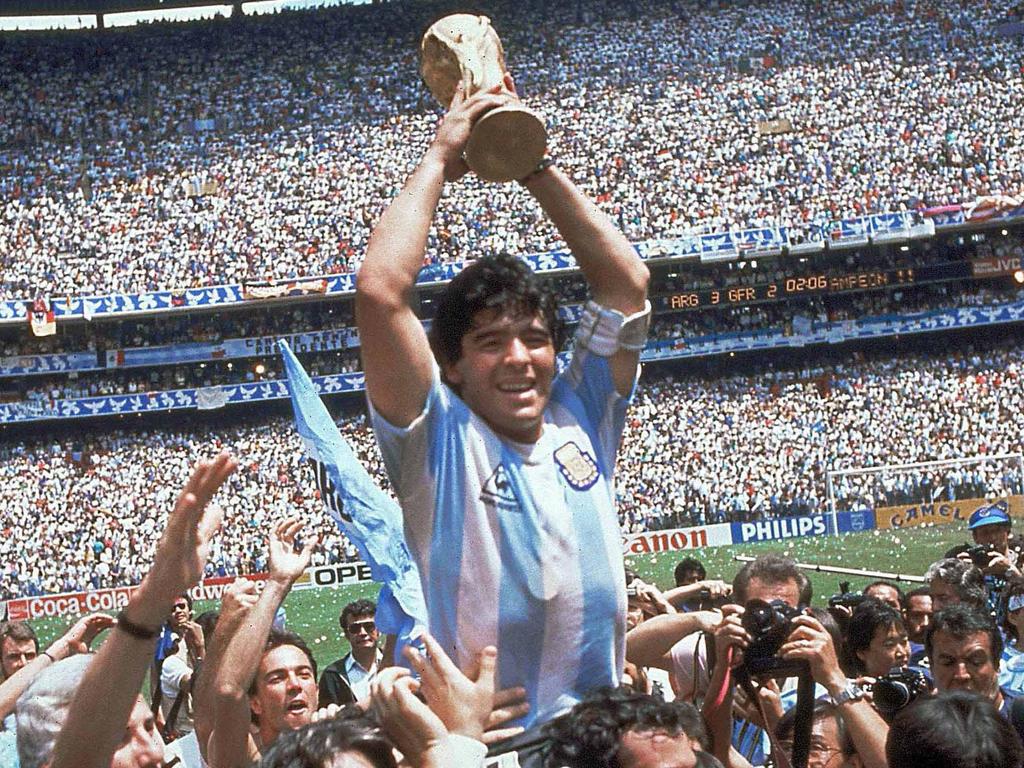
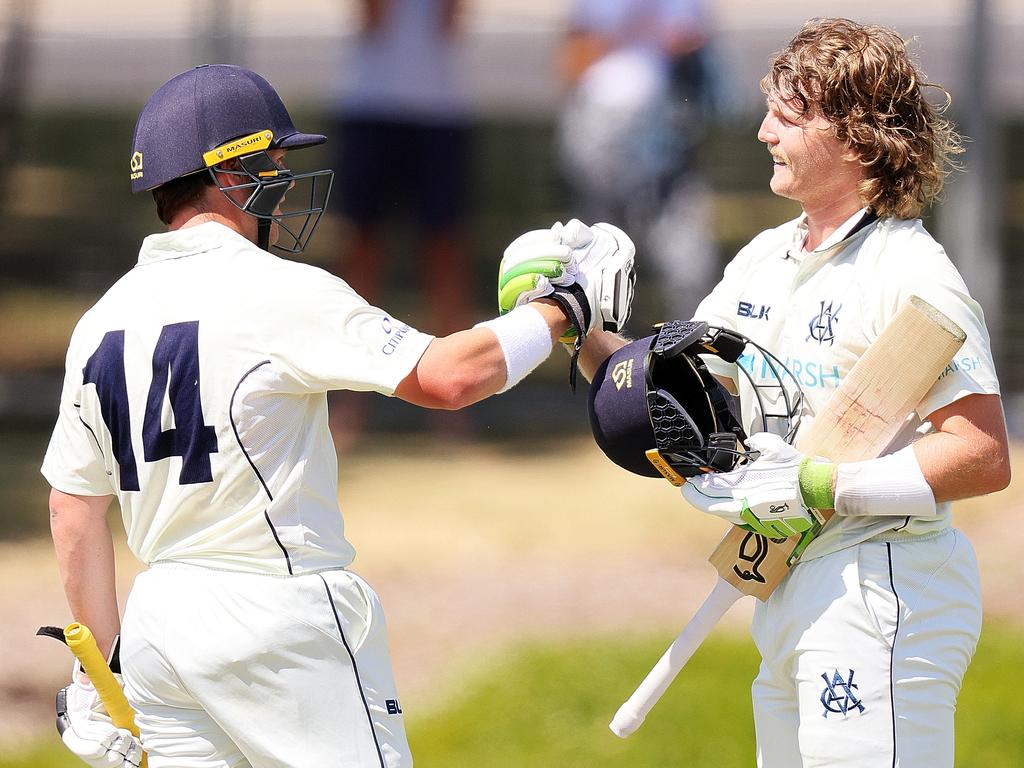
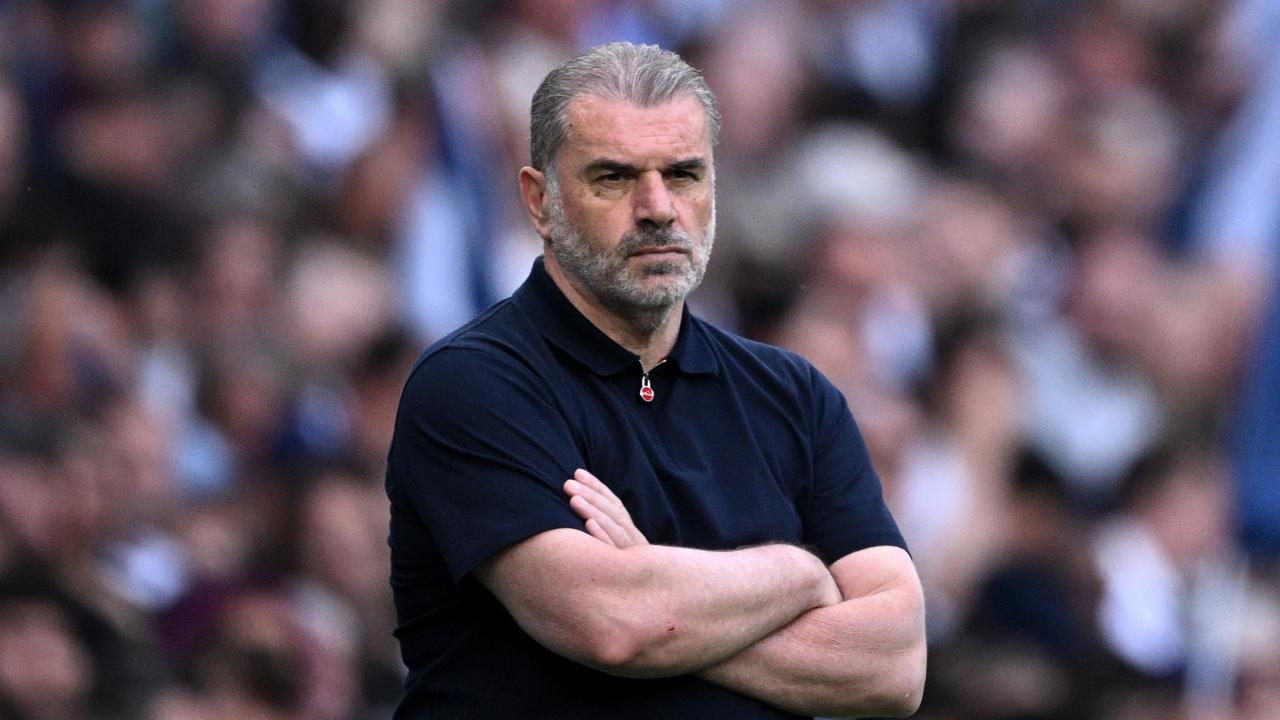
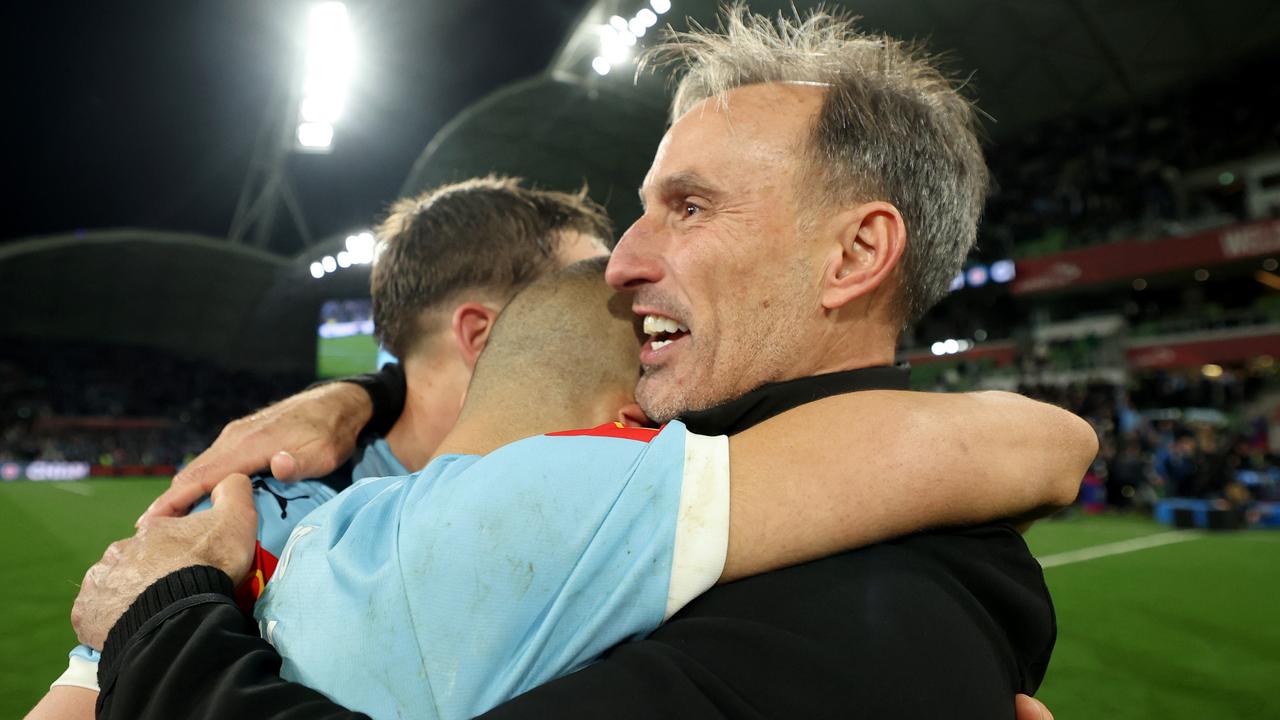
Diego Armando Maradona has bitten the dust. No rock star lived a life of greater delirium nor debauchery. He was shameless about it. He knew the drugs would kill him, and they did, so he got that one right. He made no bones about being here for a good time, not a long time. Both wishes came true before his ripped, torn, battered, bruised, alcohol-soaked, drug-ravaged heart finally packed it in. Sixty’s not a bad innings when you’ve spent most of it having a wild slog.